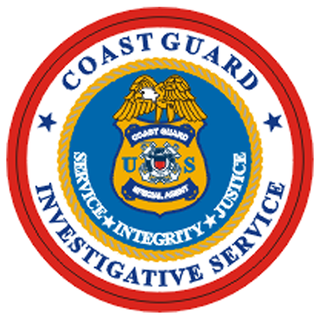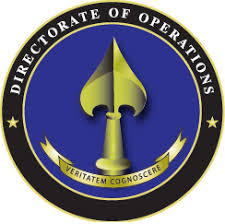Espionage, spying or intelligence gathering is the act of obtaining secret or confidential information (intelligence) from non-disclosed sources or divulging of the same without the permission of the holder of the information for a tangible benefit. A person who commits espionage is called an espionage agent or spy. Any individual or spy ring, in the service of a government, company, criminal organization, or independent operation, can commit espionage. The practice is clandestine, as it is by definition unwelcome. In some circumstances, it may be a legal tool of law enforcement and in others, it may be illegal and punishable by law.

The Defense Intelligence Agency (DIA) is an intelligence agency and combat support agency of the United States federal government, specializing in defense and military intelligence.

Counterintelligence is an activity aimed at protecting an agency's intelligence program from an opposition's intelligence service. It includes gathering information and conducting activities to prevent espionage, sabotage, assassinations or other intelligence activities conducted by, for, or on behalf of foreign powers, organizations or persons.

SMERSH was an umbrella organization for three independent counter-intelligence agencies in the Red Army formed in late 1942 or even earlier, but officially announced only on 14 April 1943. The name SMERSH was coined by Joseph Stalin. The formal justification for its creation was to subvert the attempts by Nazi German forces to infiltrate the Red Army on the Eastern Front.
An intelligence officer is a person employed by an organization to collect, compile or analyze information which is of use to that organization. The word of officer is a working title, not a rank, used in the same way a "police officer" can also be a sergeant, or in the military, in which non-commissioned personnel may serve as intelligence officers.
A special agent is an investigator or detective for a governmental or independent agency, who primarily serves in criminal investigatory positions. Additionally, many federal and state special agents operate in "criminal intelligence" based roles as well. Within the U.S. federal law enforcement system, dozens of federal agencies employ federal law enforcement officers, each with different criteria pertaining to the use of the titles Special Agent and Agent.

The United States Naval Criminal Investigative Service (NCIS) is the primary law enforcement agency of the U.S. Department of the Navy. Its primary function is to investigate criminal activities involving the U.S. Navy and U.S. Marine Corps, though its broad mandate includes national security, counterintelligence, counter-terrorism, cyber warfare, and the protection of U.S. naval assets worldwide. NCIS is the successor organization to the former Naval Investigative Service (NIS), which was established by the Office of Naval Intelligence after the Second World War.

Ana Belén Montes is a former American senior analyst at the Defense Intelligence Agency in the United States who spied on behalf of the Cuban government for 17 years.

The Coast Guard Investigative Service (CGIS) is a division of the United States Coast Guard that investigates crimes where the U.S. Coast Guard has an interest. It is composed of civilian (GS-1811), active duty, reserve enlisted, and warrant officer special agents.

The Directorate of Operations (DO), less formally called the Clandestine Service, is a component of the US Central Intelligence Agency. It was known as the Directorate of Plans from 1951 to 1973; as the Directorate of Operations from 1973 to 2005; and as the National Clandestine Service (NCS) from 2005 to 2015.
The National Security Agency (NSA), the main signals intelligence organization of the United States, has been featured in numerous works of spy fiction over the past decades in novels, film, television, and various games. The depictions of the NSA have contributed to the growing public awareness of this highly-secretive organization. NSA's mystique makes it a popular candidate for the role of a powerful antagonist and the agency has been portrayed performing tasks that are or which may be illegal. The depictions range from ones based on some actual elements to using completely fictional units or operations.

The Counter Intelligence Corps was a World War II and early Cold War intelligence agency within the United States Army consisting of highly trained special agents. Its role was taken over by the U.S. Army Intelligence Corps in 1961 and, in 1967, by the United States Army Intelligence Agency. Its functions are now performed by its modern-day descendant organization; United States Army Counterintelligence. The National Counter Intelligence Corps Association (NCICA), a veterans' association, was established in the years immediately following World War II by Military Intelligence agents who had served in every area of military and domestic operations. The organization meets annually. Its newsletter, the Golden Sphinx, is published quarterly.

Marine Corps Intelligence is an element of the United States Intelligence Community. The Director of Intelligence supervises the Intelligence Department of HQMC and is responsible for policy, plans, programming, budgets, and staff supervision of Intelligence and supporting activities within the U.S. Marine Corps as well as supervising the Marine Corps Intelligence Activity (MCIA). The Department supports the Commandant of the Marine Corps (CMC) in his role as a member of the Joint Chiefs of Staff (JCS), represents the service in Joint and Intelligence Community matters, and exercises supervision over the MCIA.
The Clandestine HUMINT page adheres to the functions within the discipline, including espionage and active counterintelligence.
National governments deal in both intelligence and military special operations functions that either should be completely secret, or simply cannot be linked to the sponsor. It is a continuing and unsolved question for governments whether clandestine intelligence collection and covert action should be under the same agency. The arguments for doing so include having centralized functions for monitoring covert action and clandestine HUMINT and making sure they do not conflict, as well as avoiding duplication in common services such as cover identity support, counterespionage, and secret communications. The arguments against doing so suggest that the management of the two activities takes a quite different mindset and skills, in part because clandestine collection almost always is on a slower timeline than covert action.
Espionage and secret operations have long been a source of fiction, and the real and perceived U.S. Central Intelligence Agency (CIA) is a source of many books, films and video games. Some fiction may be historically based, or will refer to less action-oriented aspects, such as intelligence analysis or counterintelligence.

The CIA publishes organizational charts of its agency. Here are a few examples.

United States Army Counterintelligence (ACI) is the component of United States Army Military Intelligence which conducts counterintelligence activities to detect, identify, assess, counter, exploit and/or neutralize adversarial, foreign intelligence services, international terrorist organizations, and insider threats to the United States Army and U.S. Department of Defense (DoD).

The Defense Clandestine Service (DCS) is an arm of the Defense Intelligence Agency (DIA), which conducts clandestine espionage, intelligence gathering activities and classified operations around the world to provide insights and answer national-level defense objectives for senior U.S. policymakers and American military leaders. Staffed by civilian and military personnel, DCS is part of DIA's Directorate of Operations and works in conjunction with the Central Intelligence Agency's Directorate of Operations and the U.S. military's Joint Special Operations Command. DCS consists of about 500 clandestine operatives, which is roughly how many case officers the CIA maintained in the early 2000s prior to its expansion.

The 1995 CIA disinformation controversy arose when the Central Intelligence Agency revealed that between 1986 and 1994, it had delivered intelligence reports to the U.S. government based on agent reporting from confirmed or suspected Soviet operatives. From 1985 to his arrest in February 1994, CIA officer and KGB mole Aldrich Ames compromised Agency sources and operations in the Soviet Union and Eastern Europe, leading to the arrest of many CIA agents and the execution of at least ten of them. This allowed the KGB to replace the CIA agents with its own operatives or to force them to cooperate, and the double agents then funneled a mixture of disinformation and true material to U.S. intelligence. Although the CIA's Soviet-East European (SE) and Central Eurasian divisions knew or suspected the sources to be Soviet double agents, they nevertheless disseminated this "feed" material within the government. Some of these intelligence reports even reached Presidents Ronald Reagan and George H. W. Bush, as well as President-elect Bill Clinton.













